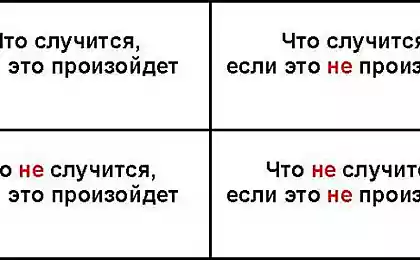302
It works! The Best Technique for Decision Making
The current century is a century of high technology, ultra-modern developments and a frantic rhythm of life. Every day, life confronts us with the need to solve a huge number of problems, for which we have to constantly think about what choices should be made in each individual situation. And in thinking about how to go, we all use some of our own skills, methods and decision-making techniques, which are based mainly on our life experiences, opinions, positions, views, points of view. But are our decisions always good and effective? It is safe to say that not always.
The decision-making technique we’ll talk about in this article isn’t magical, but it’s so adaptive and easy to use that it’s considered one of the best available today. It is called the “Descartes Square”.
To avoid unnecessary questions, it should be said that the author of this technique is René Descartes - a French philosopher, physiologist, physicist, mechanic, mathematician, as well as the founder of algebraic symbolism and analytical geometry and the author of the philosophical method of radical doubt.
Descartes Square The Descartes Square is an extremely simple decision-making technique that requires very little time to use. With the help of Descartes Square, it is easy to establish the most significant selection criteria, as well as assess the consequences of any variant of the decision.
If you look at the life of the average person, you can see that when he is in a situation where you need to make decisions, he tends to focus on one or two of its features, thereby driving himself into a kind of impasse, in which other significant criteria of choice are not noticed. In addition, a person’s standard thinking contributes to the fact that he asks himself only one question: “What will happen if this happens?”, because a normal behavior scenario involves performing an action and assessing the feedback that follows it. But in practice it has been proved hundreds of times that it is necessary first to think thoroughly and only then to perform the action. And Descartes Square is just designed to think first, but not just go through a few options in your head, but write everything down on paper, following a certain technology.
As an example, we can cite the following situation: you want to change your occupation (to get a new job, do your own business, go freelance, etc.), but you can not get rid of doubts about this. Of course, you see all the advantages and advantages of a new activity, but you do not know what it is like to do something that you have not yet done, and, accordingly, hesitate in making a decision. So, using the Descartes Square, you can look at the situation from four different angles (we will continue this example later).
How to use the Descartes Square? To use the Descartes Square, you will need a piece of paper, pen or pencil. Once these tools are ready, you can start working with Square, which involves answering four basic questions. These four questions can be represented figuratively as four points of observation of the problem, from which you can look at the problem from different angles and get the most objective view of it. It is very important to give as many answers to each of the four questions as possible, because this will allow you to consider the maximum number of features of the problem.
The Descartes Square is as follows:
We ask ourselves four questions and answer them as follows: For a visual examination of the working principle of the Descartes Square, let us take the same example of a change in activity that we have discussed above.
What would happen if that happened? This question implies the search for advantages from obtaining the desired. The word “this” should mean the implementation of the decision. The first question is the most obvious and for this reason it is very important to find as many answers as possible, i.e. not to dwell on what comes to mind first. The answers to this question will motivate you to make a decision.
What happens if I change my job?
What happens if I don’t change my job?
What won’t happen if I change my career?
What won’t happen if I don’t change my career?
Firstly, you can simply get confused in your answers, and secondly, the subconscious mind of the person works in such a way that it ignores the “NO” particle, which is why there is a high probability of making mistakes. Therefore, be sure to use a leaf and a pen, you can even print the Square in a large format, and answer each of the questions in the relevant sector. And the process of writing answers will, as it were, convert mental arguments and fantasies into a logical letter form, which will help you make a decision.
P.S. And remember, just changing our consumption – together we change the world!
Source: 4brain.ru/blog/%D0%BA%D0%B2%D0%B0%B4%D1%80%D0%B0%D1%82-%D0%B4%D0%B5%D0%B0%D0%B0%D1%80%D0%B0/
The decision-making technique we’ll talk about in this article isn’t magical, but it’s so adaptive and easy to use that it’s considered one of the best available today. It is called the “Descartes Square”.
To avoid unnecessary questions, it should be said that the author of this technique is René Descartes - a French philosopher, physiologist, physicist, mechanic, mathematician, as well as the founder of algebraic symbolism and analytical geometry and the author of the philosophical method of radical doubt.
Descartes Square The Descartes Square is an extremely simple decision-making technique that requires very little time to use. With the help of Descartes Square, it is easy to establish the most significant selection criteria, as well as assess the consequences of any variant of the decision.
If you look at the life of the average person, you can see that when he is in a situation where you need to make decisions, he tends to focus on one or two of its features, thereby driving himself into a kind of impasse, in which other significant criteria of choice are not noticed. In addition, a person’s standard thinking contributes to the fact that he asks himself only one question: “What will happen if this happens?”, because a normal behavior scenario involves performing an action and assessing the feedback that follows it. But in practice it has been proved hundreds of times that it is necessary first to think thoroughly and only then to perform the action. And Descartes Square is just designed to think first, but not just go through a few options in your head, but write everything down on paper, following a certain technology.
As an example, we can cite the following situation: you want to change your occupation (to get a new job, do your own business, go freelance, etc.), but you can not get rid of doubts about this. Of course, you see all the advantages and advantages of a new activity, but you do not know what it is like to do something that you have not yet done, and, accordingly, hesitate in making a decision. So, using the Descartes Square, you can look at the situation from four different angles (we will continue this example later).
How to use the Descartes Square? To use the Descartes Square, you will need a piece of paper, pen or pencil. Once these tools are ready, you can start working with Square, which involves answering four basic questions. These four questions can be represented figuratively as four points of observation of the problem, from which you can look at the problem from different angles and get the most objective view of it. It is very important to give as many answers to each of the four questions as possible, because this will allow you to consider the maximum number of features of the problem.
The Descartes Square is as follows:
We ask ourselves four questions and answer them as follows: For a visual examination of the working principle of the Descartes Square, let us take the same example of a change in activity that we have discussed above.
What would happen if that happened? This question implies the search for advantages from obtaining the desired. The word “this” should mean the implementation of the decision. The first question is the most obvious and for this reason it is very important to find as many answers as possible, i.e. not to dwell on what comes to mind first. The answers to this question will motivate you to make a decision.
What happens if I change my job?
- If I change my career, I will take the first step towards my dream of doing something I really enjoy.
- If I change my career, I can stop working for my uncle and control my work and my income.
- If I change my career, it will show my courage and I will respect myself more.
- If I change my career, I can prove to those around me that I am serious about changing my life.
- If I change my profession, it will be my motivation to gain new knowledge, master new skills.
- If I change my career, I can start doing something new.
- If I change my career, I will stop doubting the right choice.
What happens if I don’t change my job?
- If I don’t change my career, I won’t have to give up my lifestyle.
- If I don’t change my career, I won’t worry about learning new things and learning new things, because it might not work.
- If I don’t change my career, I can relax on my weekends.
- If I don’t change my career, I won’t have to explain or justify myself to anyone.
- If I don't change my career, I can think about it in the future. Maybe we should really wait.
- If I don't change my career, I can dream about doing what I really like.
- If I don’t change my career, I will prove to the people around me that I am happy with the current state of affairs.
What won’t happen if I change my career?
- If I change my career, I will not be able to live the life I have been so used to for many years.
- If I change my career, I will no longer be able to delay the search for new opportunities.
- If I change my occupation, I will no longer be able to rest on my usual weekends.
- If I change my occupation, I will not have enough time for a purposeless but pleasant pastime.
- If I change my profession, I will no longer have the opportunity to communicate with my former colleagues and go to fun corporate parties.
- If I change my career, I will no longer have the same attitude of the people around me.
What won’t happen if I don’t change my career?
- If I do not change my career, I will not have the opportunity to realize my dream of earning money doing what I really like.
- If I don’t change my career, I won’t be able to stop working for my uncle, which means I won’t be able to control my work and my income.
- If I don’t change my career, I won’t respect myself anymore because I’m afraid of life changing.
- If I don’t change my career, no one (including myself) will believe that I am serious about changing my life.
- If I don’t change my career, I won’t be motivated to learn new things and new skills.
- If I do not change my career, I will not be able to get rid of my doubts and will continue to worry about not making a decision.
Firstly, you can simply get confused in your answers, and secondly, the subconscious mind of the person works in such a way that it ignores the “NO” particle, which is why there is a high probability of making mistakes. Therefore, be sure to use a leaf and a pen, you can even print the Square in a large format, and answer each of the questions in the relevant sector. And the process of writing answers will, as it were, convert mental arguments and fantasies into a logical letter form, which will help you make a decision.
P.S. And remember, just changing our consumption – together we change the world!
Source: 4brain.ru/blog/%D0%BA%D0%B2%D0%B0%B4%D1%80%D0%B0%D1%82-%D0%B4%D0%B5%D0%B0%D0%B0%D1%80%D0%B0/























